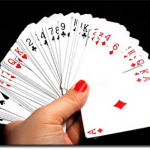Every casino game has it and every gambler has heard it: a “strategy” or a “system” a fellow patron, friend or expert swears by or recommends wholeheartedly. Devised plans and tactical preparations are natural things to expect when you’re out at the tables with players who love the game or live by it.
Blackjack is the most popular game in the world because we, as players, have agency and control over our bets. Decision-making and smart-thinking is not just an option; it’s necessary to play and win the game, and unlike games like Roulette where a win is 100% determined by chance and luck, the game of 21 can be won with brains.
In the simplest terms, blackjack betting systems are ways of using money management to maximise our winnings and to walk away with profits. You can be the luckiest blackjack player around, but if you don’t follow basic money management at all, you’re going to eventually walk away in the red. Unlike basic, universal blackjack strategies or basic strategy, betting systems are constructed more out of following patterns rather basing moves on mathematical probability.
Before we examine the most popular blackjack betting strategies, there are two main types of blackjack betting systems which each strategy can be defined by.
Blackjack sites for online players
What is a Negative Progressive System in Blackjack?
A negative progressive system involves increasing or doubling your bets after each loss. Strategies which revolve around this system are based on the high probability that you will recoup your losses over time and gain a profit after a win down the track.
Negative progressive systems are popular but not for the weak-hearted or those with smaller bankrolls. The most prominent example, the Martingale strategy, can drain even the most generous bankroll within a few consecutive losses. Along with influencing factors such as imposed maximum table limits, these sorts of systems can be unwise for players who are uneducated or not careful when employing such tactics.
What is a Positive Progressive System in Blackjack?
A positive progressive system involves increasing your bets after each win and decreasing your bets after each loss. Strategies which revolve around this system are based more around maximising winning streaks rather than chasing losses and knowing when to go for the big bets.
Positive progressive systems are slower in structure but a lot more friendlier to newbies. A strategy such as the Paroli is perfect for players who do not have a big bankroll or who aren’t willing to risk a large amount after each loss.
The Martingale
The Martingale strategy is one of the oldest devised betting systems in the world and the most alluring. It’s mostly associated with roulette, but it’s also a prominent strategy employed by many blackjack players for “can’t fail” premise and widespread popularity.
The Martingale is probably the best known example of a negative progression system, one where the core principle is based on increasing your bets after each loss by doubling and recouping losses.
The whole point of the strategy is to increase your shot at the big bucks in the short-term. The only problem is we have to have the cojones to follow through, as the risk is considerable.
Martingale in Play
When we make a standard bet of $5, every time we win that hand, we make the same amount of our original bet in the next bet. Should we lose — which is, of course, always a high possibility — we counter this by doubling our wagers on the next hand following the loss. Whenever we eventually win, we revert back to our original $5 starting bet.
For example: if we placed a $5 wager on a hard hand of 19 and win, we make a profit of $5 and continue to bet $5 on the next bet. If happened to lose that hand, though, we proceed to place a $10 wager for the next game — double our original $5 bet. If we lose again and again:
We bet $20 and lose ($35 in total losses).
Wet bet $40 and lose ($75 in total losses).
We bet $80 and lose ($155 in total losses).
We bet $160 and lose ($315 in total losses).
Wet bet $320 and lose ($635 in total losses).
We bet $640 and lose ($1,275 in total losses).
We bet $1,280 and lose ($2,555 in total losses).
Final Verdict
In essence, players who follow the Martingale rely on the eventual long-term win to pull them through, even after huge losses along the way. After a series of losing hands, the probability of a continuous streak of losses theoretically lessens every hand until we win, and when we eventually have a winning hand once more, our net gain will be up by $10, along with the return of our past losses. But would you risk another $2,560 to win such a measly amount of profit?
The problem with the Martingale strategy is even with starting bets as small as $5, we’re in danger of losing a lot of money very quickly. Add in the fact most blackjack tables enforce maximum betting limits and it’s entirely possible we’ll be unable to continue betting to win back such massive losses — otherwise, we could just as easily wipe ourselves out. For this reason, we strongly advise using the Martingale strategy to avoid serious losses — employ it for fun, not if you’re expecting actual profit.
Parlay Strategy
The Parlay betting strategy is another extremely risky system followed by many blackjack players who are not fans of the more common Martingale.
The origin of the strategy comes from the same premise banks used to compound interest, establishing it as one of the oldest methods of wagering. Despite its origins, it is one of the easiest tactics to understand given there is minimal mathematical background.
In comparison to the Martingale, the Parlay is a positive progression betting system that revolves around “letting it ride” and knowing when to use hot streaks effectively. We double our bets after each win rather than chasing losses; for some, this makes up for the fallacies of the Martingale system.
Parlay in Play
Before practicing the Parlay strategy in a game, we must set up a Win Limit and a Loss Limit to know when we are to keep our profits rather than continue to stack it atop our wins, and when we’ve lost enough to stop playing. These are crucial to the strategy because we can’t win anything if we keep wagering our profits on the line.
Setting an appropriate Win and Loss Limit is essential if we actually expect any sizeable returns. For instance, if we’re betting $10 per hand and set a Win Limit of $2,000, it’s unrealistic as we will most likely lose at least once on the way there. However, if we set a Win Limit of $150, it’s entirely possible.
We bet $10 bet and win $10 in profit.
We bet $20 and win $30 in profit.
We bet $40 and win $70 in profit.
We bet $80 and win $150 in profit.
Within four hands, we’ve reached our Win Limit and we walk away with $150. From there, if we opt to continue playing, we begin from our designated starting wager once more. A losing streak is entirely possible, but at least a hot streak is too.
A Loss Limit, too, is important. If we’re decided on betting $10 per hand, a good loss limit to abide by might be $200, but it all depends on your personal bankroll.
Final Verdict
The Parlay is only effective if we know how to set Win Limits and know how to follow them accordingly. It’s hard to keep profits and know when we’re winning when we’re letting every single wager ride on the table.
Self-imposed boundaries and restraint is absolutely necessary to even think of making an actual profit when playing by the Parlay strategy.
The D’Alembert Strategy
The D’Alembert strategy suits players who don’t want to base all of their bets on a ‘high risk, high reward’-based structure.
The strategy is named after the 18th-century mathematician Jean le Rond D’Alembert, whose theory was based on balancing out wins and losses in the long-term — his work was then translated by blackjack gamblers, even though it was never intended for the game.
D’Alembert in Play
The D’Alembert is a strategy based on a negative progression system, but with lighter consequences compared to the Martingale. We increase our bets following losses, but we do so by a strict pattern: when we lose, we increase the bet by one unit and if we win, we decrease our bet by one unit.
A $5 bet which loses at the minimum blackjack table would mean we increase our bet by one unit — this would be $10 in total. If we lost twice more, we would increase the following wagers by $15 and $20, respectively. If we eventually won the following hand, our next bet would revert back to three units at $15 total.
Compared to other strategies, the D’Alembert is easy to apply and easy to understand, with little memorisation beyond how much our last wager was.
Final Verdict
The D’Alembert strategy will carry its value depending on the individual player. It’s obviously more likeable as it doesn’t call for huge risks like the Martingale, but it can also be perceived as a ‘slower’ structure to win.
No strategy will ever win us a massive chunk of money after a few games, and they’re mostly designed and applied to make the game more fun or otherwise change our usual bets up to experiment other ways of making profits. Therefore, use the D’Alembert more as a way to restrict yourself from losing too much by abiding to a system, rather than as a tool to expect massive gains.
Paroli Strategy
The Paroli strategy is the exact opposite to the Martingale; it’s called the Anti-Martingale strategy, or the Reverse Martingale for a reason! If you’re already familiar with the Martingale, you’ll have no trouble learning the ropes of the Paroli.
Paroli in Play
The Paroli is based on a positive progression system where we increase our bets by doubling following each win. Before we employ the strategy, we need to set a Win Limit to know when we eventually stop doubling down after every win to collect our profits.
If we set a Win Limit of $160 and wager $5 on a hand and win:
Our next wager is $10; if we won again, the next would be $20.
If we won again, the next would be $40.
If we won again, the next would be $80.
If we won again, the next would be $160.
Because our Win Limit was $160, we refrain from doubling down again and take our profit. If we want to continue playing, we simply start at our pre-determined starting wager once more; in this instance, it’s $5.
Conclusion
The Paroli strategy is an easy one to understand, but it’s also just as prone to losses as every other strategy out there. There’s no doubt we’ll face a loss in between our Win Limit, so set one you feel comfortable with and that is also realistic for your bankroll.
Like all blackjack betting strategies, the Paroli needs to be followed in the long-term. Instant wins aren’t going to happen and the Paroli is more about the excitement than anything: riding a winning hot streak while we still can, and maybe make a lot more money while we’re at it.








